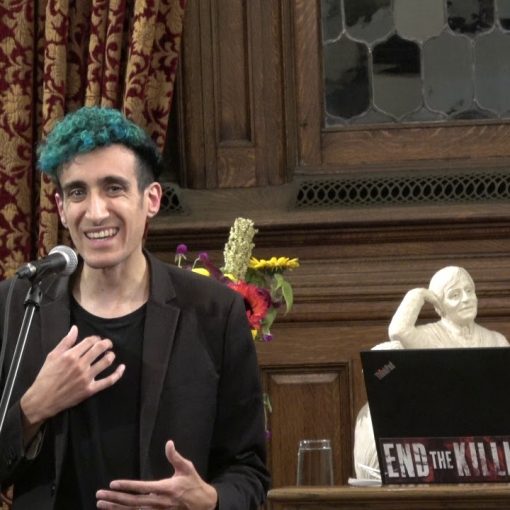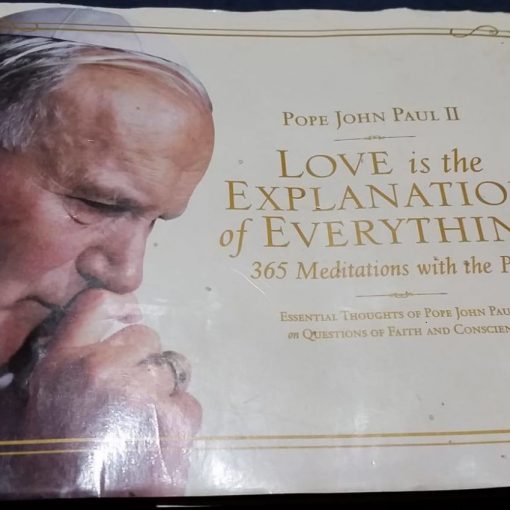As an avid reader of both David Weinberger and Pope Francis, it was very interesting to see those two worlds collide in Weinberger’s cross-tradition interpretation of Pope Francis’ message for World Communications Day.
First, Weinberger looks at Pope Francis’ initial characterization of the Internet:
The internet, in particular, offers immense possibilities for encounter and solidarity. This is something truly good, a gift from God.
Weinberger calls this a “remarkable characterization” compared to all of the other ways Pope Francis could have started:
Not: The Internet is a source of temptations to be resisted. Not: The Internet is just the latest over-hyped communication technology, and remember when we thought telegraphs would bring world peace? Not: The Internet is merely a technology and thus just another place for human nature to reassert itself. Not: The Internet is just a way for the same old powers to extend their reach. Not: The Internet is an opportunity to do good, but be wary because we can also do evil with it. It may be many of those. But first: The Internet — its possibilities for encounter and solidarity — is truly good. The Internet is a gift from God.
While I agree with Weinberger, there is also something that is not fundamentally new. Even just looking at past World Communications Day messages over the past quarter century, Pope Benedict XVI and Pope John Paul II both typically lead with the goodness of the new technology.
“I wish to consider the development of digital social networks which are helping to create a new “agoraâ€, an open public square in which people share ideas, information and opinions, and in which new relationships and forms of community can come into being. These spaces, when engaged in a wise and balanced way, help to foster forms of dialogue and debate which, if conducted respectfully and with concern for privacy, responsibility and truthfulness, can reinforce the bonds of unity between individuals and effectively promote the harmony of the human family. The exchange of information can become true communication, links ripen into friendships, and connections facilitate communion.”
Truth, Proclamation and Authenticity of Life in the Digital Age (Pope Benedict XVI, 2011):
“New horizons are now open that were until recently unimaginable; they stir our wonder at the possibilities offered by these new media and, at the same time, urgently demand a serious reflection on the significance of communication in the digital age. This is particularly evident when we are confronted with the extraordinary potential of the internet and the complexity of its uses.”
“Many benefits flow from this new culture of communication […] While the speed with which the new technologies have evolved in terms of their efficiency and reliability is rightly a source of wonder, their popularity with users should not surprise us, as they respond to a fundamental desire of people to communicate and to relate to each other.”
The Media: A Network for Communication, Communion and Cooperation (Pope Benedict XVI, 2006):
“Technological advances in the media have in certain respects conquered time and space, making communication between people, even when separated by vast distances, both instantaneous and direct. This development presents an enormous potential for service of the common good and “constitutes a patrimony to safeguard and promote” (Rapid Development, 10).”
The Communications Media: At the Service of Understanding Among Peoples (Pope John Paul II, 2005):
“Modern technology places at our disposal unprecedented possibilities for good”
The Media and the Family: A Risk and a Richness (Pope John Paul II, 2004):
“The extraordinary growth of the communications media and their increased availability has brought exceptional opportunities for enriching the lives not only of individuals, but also of families.”
Internet: A New Forum for Proclaiming the Gospel (Pope John Paul II, 2002):
“For the Church the new world of cyberspace is a summons to the great adventure of using its potential to proclaim the Gospel message.”
Mass media: a friendly companion for those in search of the Father (Pope John Paul II, 1999):
“With the recent explosion of information technology, the possibility for communication between individuals and groups in every part of the world has never been greater. Yet, paradoxically, the very forces which can lead to better communication can also lead to increasing self-centredness and alienation. We find ourselves therefore in a time of both threat and promise.”
Even on other technologies… Videocassettes and audiocassettes in the formation of culture and of conscience (Pope John Paul II, 1993):
“Let me say again, and with emphasis, that the audiocassette and the videocassette are gifts of God, gifts, we may say, kept in His treasury through all the ages until our time, kept — for us.”
And even pretty early on in the days of “computer culture” going mainstream… The Christian Message in a Computer Culture (Pope John Paul II, 1990):
“Surely we must be grateful for the new technology which enables us to store information in vast man-made artificial memories, thus providing wide and instant access to the knowledge which is our human heritage, to the Church’s teaching and tradition, the words of Sacred Scripture, the counsels of the great masters of spirituality, the history and traditions of the local Churches, of Religious Orders and lay institutes, and to the ideas and experiences of initiators and innovators whose insights bear constant witness to the faithful presence in our midst of a loving Father who brings out of his treasure new things and old (cf. Mt 13:52).”
Really, what they’re doing here is following the basic pattern of Genesis — first, the goodness of creation, then, the problem of sin.
So, the affirmation of goodness can be traced back to the Church’s earliest proclamations on the Internet and computer culture, in World Communications Day messages as well as in other documents. But, there is something that seems to have shifted about the Papal characterizations of what the Internet is. As Weinberger writes:
The Catholic Church put the “higher” in “hierarchy,” so it’d be understandable if it viewed the Internet as a threat to its power. Or as a source of sinful temptation. Because it’s both of those things. The Pope might even have seen the Internet quite positively as a powerful communication medium for getting out the Church’s message.
While the first two characterizations are more caricatures, the third is not. Certainly in some messages from Pope John Paul II, you can see more of an emphasis on the Internet as a tool for evangelization (though, keeping in mind that evangelization requires dialogue or personal communication and encounter — it’s still not a broadcast approach). It might be said that Pope Benedict XVI picked up on this, but further developed some thinking on relationships, and here Pope Francis picks up and focuses on the Internet as a way of encountering our neighbours. A more thorough analysis of other writings might be required to support that conclusion, but there does seem to be something new in Pope Francis’ emphasis.
As Pope Francis writes (emphasis added):
It is not enough to be passersby on the digital highways, simply “connected”; connections need to grow into true encounters. We cannot live apart, closed in on ourselves. We need to love and to be loved. We need tenderness. Media strategies do not ensure beauty, goodness and truth in communication. The world of media also has to be concerned with humanity, it too is called to show tenderness. The digital world can be an environment rich in humanity; a network not of wires but of people. The impartiality of media is merely an appearance; only those who go out of themselves in their communication can become a true point of reference for others. Personal engagement is the basis of the trustworthiness of a communicator. Christian witness, thanks to the internet, can thereby reach the peripheries of human existence.
As Weinberger puts it (emphasis added):
For the Pope, the Internet is an opportunity to understand one another by hearing one another directly. This understanding of others, he says, will lead us to understand ourselves in the context of a world of differences […]
If we frame the Internet as being about people being human to one another, people being neighbors, the differences in belief are less essential and more tolerable. Neighbors manifest love and mercy. Neighbors find value in theirs differences. Neighbors first, communicators on occasion and preferably with some beer or a nice bottle of wine.
Neighbors first. I take that as the Pope’s message, and I think it captures the gift the Internet gives us. It is also makes clear the challenge. The Net of course poses challenges to our souls or consciences, to our norms and our expectations, to our willingness to accept others into our hearts, but also a challenge to our understanding: Stop thinking about the Net as being about communication. Start thinking about it as a place where we can choose to be more human to one another.
That I can say Amen to.




